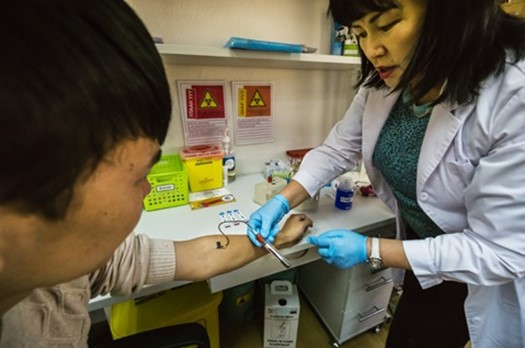HIV/AIDS and the Law
HIV/AIDS and the law is not a medical problem but also a powerful lawful and mortal request for consideration. The meeting of HIV/AIDS with the rule contains a wide range of topics, including intolerance, confidentiality, the key to healthcare, and the criminalization of HIV dispatch. Providing the privileges and lawful protections for individuals living with HIV/AIDS is important for promoting a supportive atmosphere and fighting the epidemic. This commentary analyzes the key allowed assurances and benefits for individuals with HIV/AIDS and underscores the proceeding challenges in this space.
Anti-Discrimination Ordinances
Workplace Protections:
One of the most crucial spaces of lawful defense for people living with HIV/AIDS is in the workplace. Prejudice based on HIV situations can lead to job loss, bump, or negative work conditions. In many nations, laws have been passed to stop such prejudice. For example, in the United States,(the ADA) forbids prejudice against people with disabilities, including those living with HIV, in work, shared benefits, and capacities. Employers are needed to provide appropriate concessions to workers with HIV/AIDS, provided they can complete their job responsibilities without unnecessary trouble.
Healthcare and Benefits:
Anti-discrimination rules are also open to healthcare environments. People with HIV/AIDS have the freedom to obtain medical therapy without encountering preconceptions or stigma. Healthcare providers are lawfully bound to deliver the exact measure of respect to all patients, regardless of their HIV level. Regulations such as the Affordable Care Act in the United States forbid health insurers from refusing range or setting higher bonuses established on pre-existing diseases, including HIV/AIDS.
Confidentiality and Aloneness
Medical Confidentiality:
Confidentiality of medical data is an essential request for all patients, including those with HIV/AIDS. Regulations such as (HIPAA) in the United States cover the solitude of people’s medical narratives and health data. Healthcare providers must get stoic approval before revealing HIV groups to third groups, and unauthorized exposure can result in legal liabilities.
Advised License:
Informed support is another crucial part of legal defense. Individuals must be told approximately HIV testing approaches and the significance of the results sometime recently concurring to be attempted.
This provides that people are conscious of their requests and can create educated conclusions about their fitness.
Criminalization of HIV Transmission
HIV/AIDS and the Laws:
One of the most controversial permitted issues covering HIV/AIDS is the criminalization of HIV information. In many jurisdictions, laws outlaw deliberate or careless information about HIV. These rules vary widely, with some requiring evidence of intention to send the virus and others concentrating on the loss of revealing HIV status to sexual companions. Critics claim that such rules can stigmatize people with HIV, deter individuals from obtaining pushed, and disproportionately affect marginalized districts. Rather than advancing general fitness, these rules may drive HIV-positive people confidential, out from testing and therapy.
Change Steps:
There is a developing drift to change HIV criminalization statutes. Advocates claim a more unpretentious methodology that concentrates on reason and indeed hurt or maybe than simple revelation. They moreover highlight the importance of logical understanding of HIV transmission inconveniences. For occurrence, people on appropriate Craftsmanship with an imperceptible viral burden cannot exchange the infection sexually. Rules should remember this scientific agreement to avoid unfair prosecutions.
Key to Healthcare and Medicine
Due to Health:
Access to healthcare and medicine is a basic human right. States must guarantee that people living with HIV/AIDS have entry to life-saving medicines and healthcare benefits. Global arrangements, such as the International Covenant on Economic, Social, and Cultural Rights, identify the due to fitness, which has entry to ART, preventative benefits, and good medical supervision.
Obstacles to Pass:
Despite these legal protections, many people encounter obstacles to accessing healthcare. These obstacles can have cost, geographic area, absence of infrastructure, and stigma within healthcare environments. Permitted advocacy is important to manage these obstacles and ensure that all people have fair entry to HIV precluding, including medicine, and care benefits.
International Human Rights Framework
Global Human Rights Standards:
International human ownership frameworks play a vital role in defending the freedoms of people living with HIV/AIDS. The United Nations has set policies and regulations to ensure that human rights are kept in the context of HIV/AIDS. These have the International Guidelines on HIV/AIDS and Human Rights, which deliver a broad framework for managing the lawful and human liberties issues linked to HIV/AIDS.
Part of Respectful Society:
Gracious community education is critical in supporting the opportunities of individuals living with HIV/AIDS.
These institutions function to raise attention, deliver legal services, and lobby for procedure modifications that advance human rights and social justice. Their actions are important in keeping rules liable and providing that legal protections are executed and implemented.
Conclusion
Legal protections and human rights are integral to the effective answer to HIV/AIDS laws. Anti-discrimination laws, confidentiality protections, knowledgeable support, and fair entry to healthcare are basic freedoms that must be kept for people living with HIV/AIDS. While considerable headway has been created, challenges such as the criminalization of HIV information and obstacles to healthcare entry remain. Persistent advocacy, lawful reform, and global collaboration are vital to guaranteeing that the freedoms and satisfaction of people living with HIV/AIDS are appreciated and saved. By handling these lawful and human rights cases, we can develop a more just and supporting setting for all people impacted by HIV/AIDS.
